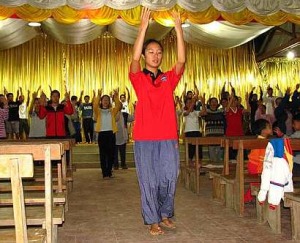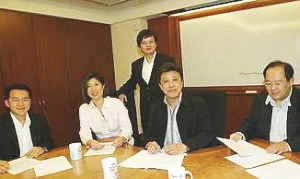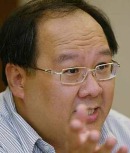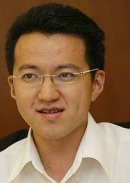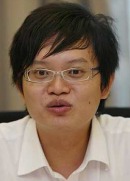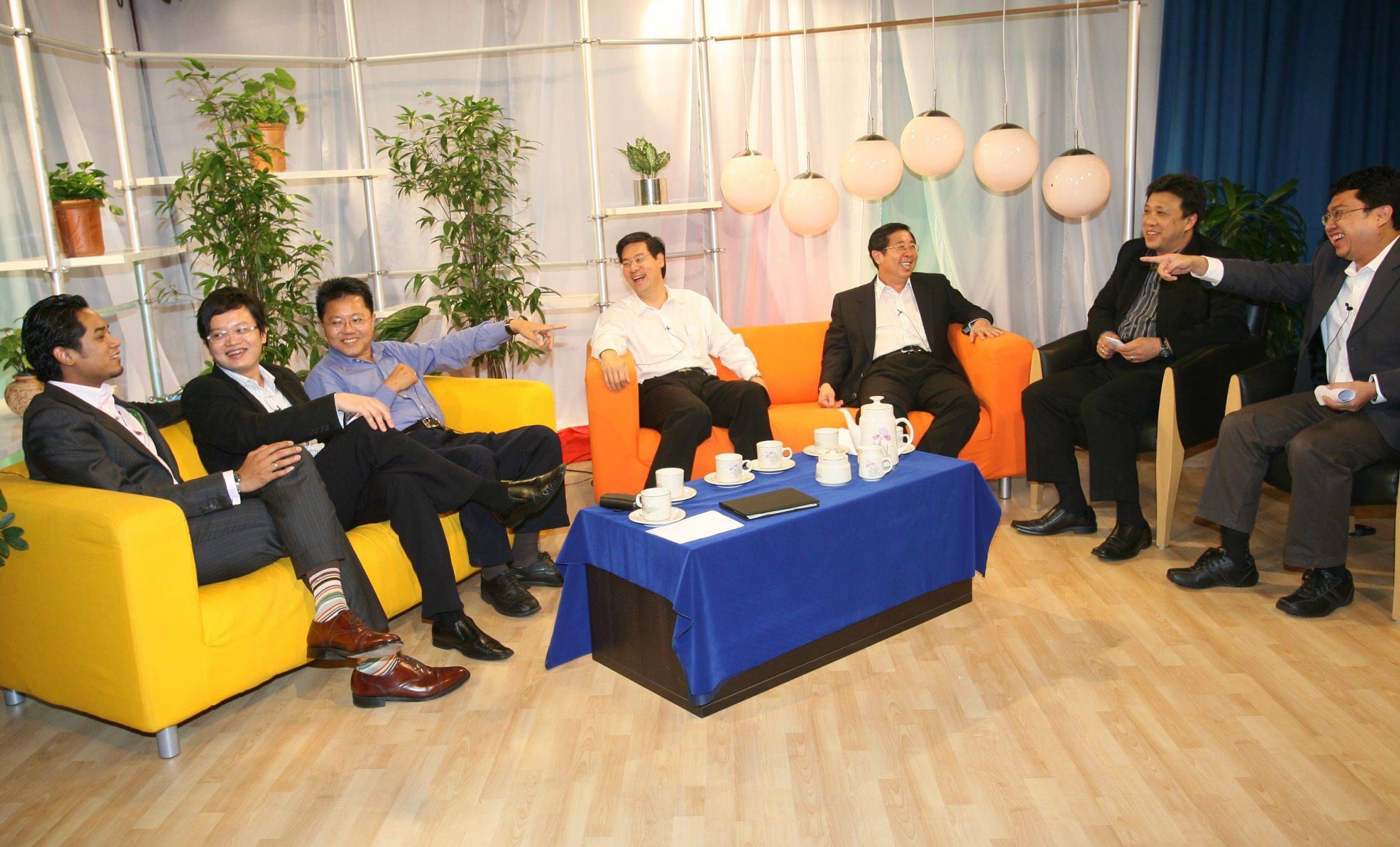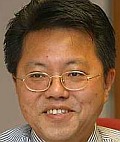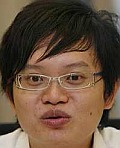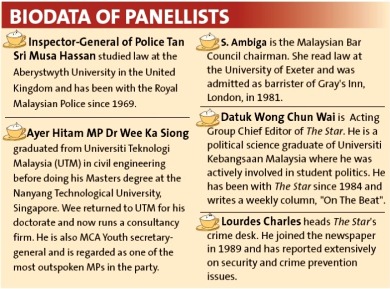Sunday December 9, 2007
CAFE LATTE CHAT
THE Café Latte session on crime and security saw Inspector-General of Police Tan Sri Musa Hassan turning up in full uniform and wearing the “Saya Anti Rasuah” badge on his chest.
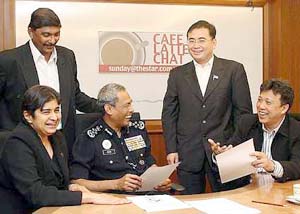 |
|
Speaking up: The panellists from left, Ambiga, Lourdes, Musa Hassan, Wee and Wong sharing a light moment during the recent discussion.
|
His presence underscored his seriousness about tackling crime issues, which have become the No. 1 concern of Malaysians who feel that the country is not as safe as it used to be.
Crime and security, said Café Latte moderator Datuk Wong Chun Wai, were set to be hot issues in the next general election. The people wanted to hear from elected representatives about what was being done to improve their standard of living and whether that included safe cities and the kind of action they could expect from the police force.
More recently, Kuala Lumpur folk have had to cope with protest gatherings, following which there had been much debate over the role of the police in dealing with the matter. Besides Musa, this session included Malaysian Bar Council chairman S. Ambiga, Ayer Hitam MP Dr Wee Ka Siong and The Star's crime desk chief Lourdes Charles.
Busting crime
Wong: How are the police addressing the people's concern about crime and security?
Musa: The trend of crime has changed. It is not like before (traditional crime) where crimes only involved local people. Globalisation has brought in an influx of immigrants and the population has increased; people are migrating from the kampung to towns and youths are getting into unlawful activities. Criminals are also not like before because we have people bringing their culture here. It is normal in Jakarta to see people racing here and there. Our youths tend to imitate the wrong things, that's why we see all these Mat Rempits now.
The police need to enhance their crime prevention techniques – more patrol cars and surveillance. I am planning a “community policy” for closer relations between the community and police. I've directed the OCPDs in Penang and Johor to draw up sectors, with a community policy officer assigned to each sector. This officer will acquaint himself with the residents and respond to problems they face. I’ve suggested that every housing area have a box for residents to address letters to the police and alert them of security problems.
I've also asked the government for equipment like CCTVs and updated office equipment. This will also help us in monitoring purposes. As for logistics, we would like to have more helicopters to detect crime because having an aerial perspective is very effective.
Wong: These things will not happen overnight. What will you be doing in the short- and middle-term?
Musa: I am utilising Rakan Cop and working towards having sectors in housing areas. This would enable the policemen to have all the information about what is happening in these areas. Intelligence gathering is also important, so I'm trying to enhance this and I’ve also asked the police to work as an integrated system.
We do not only want the CID to be handling cases but also all officers to be involved. We are constantly using them for crime prevention and other activities. There are now a number of police officers in a certain area and they being assisted by the General Operations Force.
Corruption
Wong: As a lawyer, what are your views on this, Ambiga?
Ambiga: I must be frank. The police have a serious credibility problem and it stems from corruption. I believe it is still there. The joke is that the more badges an officer has on, the more you have to pay. But I also believe it's important to give resources to the police. There have also been recommendations for an increase in police personnel. But as far as corruption is concerned, what are the concrete steps that have been taken?
Musa: There's a link between crime and corruption, that's why we are going all out in the Anti Rasuah campaign. When I took over as IGP, there were many transfers as some officers could not be stationed at certain places for various reasons. I think we’ve contained it (corruption) but it's still there. It's not easy to fight corruption because the public must also be educated. Some find the easy way out by offering bribes.
Nowadays, a lot of crimes are committed not by individuals but syndicates who deal in human trafficking, gambling and so on. These syndicates have to be tackled, especially the top guns.
Wong: Your fight against corruption has resulted in bullets being sent to you and you have some serious cases 0still pending in court. How are you coping with such issues, especially when it involves your own men?
Musa: I've given them stern warning. In several cases, I told them they would be transferred if they were still involved. But the working facilities of these policemen would have to be taken care of if they are to excel. I have urged the Government to build new police stations. You hear talk about people being arrested, placed in lock-ups and then dying while in custody. The situation becomes topsy-turvy because these are old buildings. For the new ones I’ve already planned for CCTVs to be installed so that we can monitor what's happening in the cells.
Crime in the city
Wong: Wee, Johor has a reputation as a crime-infested city.
Wee: I must congratulate the police for what they have done in Johor. I can see positive changes in terms of the security level and the people feel safer now. The crime rate has gone down tremendously. I also see the crime issue in Johor as a blessing in disguise because political parties, NGOs and top police officers in Johor joined together to fight for more equipment such as walkie-talkies and increased personnel. There are now about 1,000 police personnel looking after Johor Baru which is three times the size of Singapore.
They have even mobilised the Federal Reserve Unit and General Operations Force to assist the CID and police in intelligence work. These are the changes I have seen but there is definitely room for improvement because Johor is the most important gateway for foreigners, especially Singaporeans. When a crime in Johor is highlighted in the Singapore media, there is a kiasu attitude and they are scared to come over, especially if it involves a Singaporean.
Wong: You can’t blame them. They are coming over to spend, they want to feel safe.
Musa: We must also remember that Singapore wants people to spend within the country and boost their economy rather than come to Johor. That is why we sometimes see the Singaporean media highlighting things in Johor to deter them from coming over. We also have information about Singapore’s underground gangsters operating in Johor. That is a problem now.
I have close working relations with the Singaporean police so that we can crack down on these syndicates. Johor gangsters are so rich they are now buying property in Singapore. Most of these syndicate members are kingpins whom I am going all out to fight. But sometimes these people have close relations with certain other people, making it very hard for us to fight them.
Wong: Lourdes, do Singaporeans face a language problem when they try to lodge police reports in Johor?
Lourdes: To a certain extent, yes, because when Singaporeans go to a police station they are only proficient in English and find difficulty making a report in Bahasa Malaysia.
Wong: But there have been complaints all over about the difficulty of lodging reports and officers asking complainants to lodge the report elsewhere.
Musa: I have often asked the public to report police officers for refusing to take a report. Complain to the OCPD. The OCPD’s number is listed in the police station. If the OCPD does not act, I will personally take action against him. Like I’ve said, there are various ways to lodge a police report. You don't even have to come to the station, just call an officer and he or she will lodge the report for you. You can even write a letter to us. We will consider that as a report.
Wong: Can the police set up a roadblock and flag down people on the highways, for example, for speeding? The public thinks the police are flagging them down for money.
Musa: A policeman cannot just flag down cars. If a roadblock is to be conducted, a proper signboard and required approval must be obtained. These roadblocks are necessary because of cases of lorries being hijacked and cars stolen. I’m trying hard to clean up such perceptions because I know that when a policeman stops a car and hassles the driver, people would say “kutip duit la, itu”. If the officer is professional, just stop the car, ask for the motorist’s IC and issue a summons.
Ambiga: The police do not seem to be doing much about the Mat Rempit problem.
Musa: Our people are doing extensive surveillance on them. There have been times when they have even crashed through our roadblocks. The Mat Rempit gangs can be very aggressive and violent. There have been cases when their members were arrested and the gang threw stones at the police station where their buddies were held. The parents have a role to play here. These people are mostly teens, they don't even have licences when they begin riding motorcycles. They are blatantly going against the law and their parents should be made accountable for their actions. But people do not like it when I say this.
Ambiga: It's a responsibility but whether you can prosecute the parents is a different issue.
Wong: Crime prevention is one thing, but making the country safe is another. Recent events like the public demonstrations have caused uneasiness, especially regarding race relations. Is this a challenge for the police?
Musa: We are neutral, we're not close to any particular parties. We do not care about colour, creed or religion. We do not have such emotions. I've told my officers we are professionals, we should not have any such emotions when protecting the country and its citizens.
Take the Bersih rally. They want the Government to improve the electoral system. They urged the use of indelible ink and even to do away with the postal votes. They want more media coverage of the Opposition. They raise the issue of phantom voters in the electoral roll. They have met the Election Commission, which has agreed to quite a number of the suggestions made. As far as I can see, the authorities have tried to accommodate them.
Wong: The perception is that the police are more flexible when it comes to pro-government gatherings.
Musa: It boils down to the same thing. All gatherings need a permit.
Ambiga: Pro-government gatherings get the permit and vice-versa for other gatherings.
Musa: During the Hindraf demonstration, there were fiery speeches. Being in a multi-racial country, one cannot just say anything one likes because that would hurt feelings. A number of speeches were made under the pretext of a Deepavali gathering. They even went to the point where they claimed there was ethnic cleansing of Indians in the country. It is very bad for a multi-racial country.
Ambiga: But what about the Bersih rally?
Musa: We have to ask what was the objective of having the rally. Of course, they wanted to tell people that the government was not right.
Ambiga: But what's the harm in that?
Musa: There is no harm, but by then Bersih had already had the discussion with the relevant authorities of their intention, and it was made known to everyone. And most of the things discussed that were deemed of significance to the electoral roll had already been agreed upon.
Ambiga: Not enough credit is given to the rakyat. I believe that we have the ability to gather peacefully.
Lourdes: There have been approved gatherings by the National Union of Bank Employees (NUBE) and Cuepacs but at times such gatherings get unruly. Such was the case in Batu Buruk where fiery speeches resulted in the situation getting out of hand. It is a bit sensitive.
Ambiga: There are allegations that government agencies are the ones going to such events and causing the problems.
Musa: Such things could be likened to throwing stones and then hiding one's hand. I was very angry after the Hindraf rally because there were claims that the police had murdered someone during the incident. This is completely ludicrous.
Wong: Are you under pressure with people planning to hold counter demonstrations with even bigger crowds?
Musa: That is what I'm afraid of. SMSes have been going out supposedly from Indians warning that Malays would be gathering to fight them. Then the Malays would also supposedly send warnings that there would be riots, another May 13. Such rumours are really bad and I've made press statements on this.
Wee: As an MP, I have a different view. I do not subscribe to any form of violence or gathering that would incite racial hatred. That is my fundamental principle but the issues raised by Hindraf, the social problems among the Indians, need to be addressed by the Government. Many of them are unemployed and forced to move out from the estates. They end up in the city with nothing. We have to address these issues.
On the other hand, a friend of mine who owns a petrol kiosk along Jalan Tun Razak said that during the Hindraf gathering, a group of Indian youths went into his shop and took cigarettes and mineral water without paying. My friend was too afraid to stop them. No one dared to say anything. It got out of hand because the Hindraf organisers could not control them.
Ambiga: The minute the police heard about the Hindraf gathering, the permit was refused. There was just too much opposition to their intent. If the police had let them go on, the incident would have been concluded under an hour and they would have gone home. The same applies to the Bersih gathering. The police came down so hard and the reaction was equally hard.
Musa: We did not want the same thing to happen as in Batu Buruk. We informed them (the Bersih organisers) that if they wanted to send a memorandum to the Yang di-Pertuan Agong, we would personally assist and escort them. There was no need for a gathering. It was the same with Hindraf. We were afraid of a racial clash so we would not allow for it.
It would have been better if they had gathered at Stadium Negara or Stadium Bukit Jalil. I might even have joined them there. I acknowledge human rights because it is in our Constitution. But then again we must look at the issue of rights. Every person would have his own translation of what “rights” constitute and that would cause problems.
Wong: The situation arose because for the past 20 or 30 years, people have not really been able to speak out. But times have changed.
Musa: I believe in having dialogues. We are a democratic country, why can't we have dialogues with the leaders instead of going to the street? Yes, you get people to join you, but would it not be more sensible to have the leaders hear what you have to say? We had roadblocks because we received information that Hindraf would use underground gangsters and we wanted to ensure that no weapons or arms were used.
Ambiga: Don't you agree the Bersih march was peaceful?
Musa: I cannot agree when you have more than 10,000 people gathering, and all that shouting and jeering. Was there really any need for that? The government and rakyat knew what they wanted because they had spoken and negotiated with the EC. What then is the use of all these demonstrations? The Constitution states that we can have the freedom of speech and gathering as long as it is in accordance with the law. That is why the law is there.
Ambiga: We have to change our mindset. There is a place for peaceful assemblies in civilised society and we should find a place to do these things.
Wee: We must utilise existing platforms to convey grievances of the community. There are political parties and NGOs that address the issues affecting Indians and even bring them up to the Prime Minister or his deputy.
I do not think Hindraf had no other alternative to attract the government's attention. As a multi-racial country, we have to observe stability.
I read the Hindraf letter, which was very controversial. There were claims of a so-called policy of “cleansing”, which is very serious. If you talk about the unemployment of Indians or vocational training for Indian youths, I am certain the government would listen.
Ambiga: The reason this happened was because no one was listening. The street demonstration was a symptom of underlying problems. Our focus should be on those underlying problems. It was frightening for me when I went to the police station to see the 90% of those remanded from the Hindraf rally were young people.
